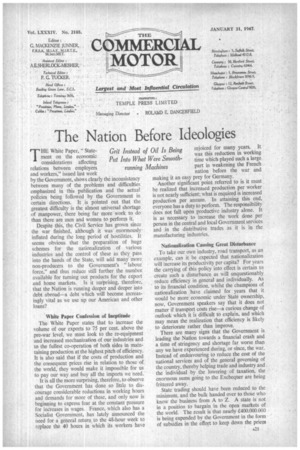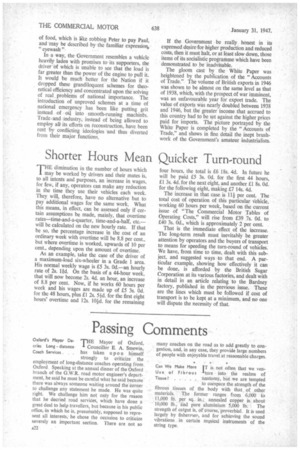The Nation Before Ideologies
Page 23

Page 24

If you've noticed an error in this article please click here to report it so we can fix it.
Grit Instead of Oil Is Being Put Into What Were Smoothrunning Machines THE White Paper, "Statement on the economic considerations affecting relations between employers and workers," issued last week by the Government, shows clearly the inconsistency between many of the problems and difficulties emphasized in this publication and the actual policies being followed by the Government in certain directions. It is pointed out that the greatest difficulty is the almost universal shortage of manpower, there being far more work to do than there are men and women to perform it.
Despite this, the Civil Service has grown since the war finished, although it was enormously' inflated during the tang period of hostilities. It seems obvious, that the preparation of huge schemes for the nationalization of various industries and the control of these as they pass into the bands of the State, will add many more non-producers to the Government's "labour force," and thus reduce still further the number available for turning out products for the export and home markets. Is it surprising, therefore, that the Nation is running deeper and deeper into debt abroad—a debt which will become increasingly vital as we use up our American and other loans?
White Paper Confession of Ineptitude The White Paper states that to increase the volume of our exports to 75 per cent. above the pre-war level, we must look to the re-equipment and increased mechanization of our industries and to the fullest co-operation of both sides in maintaining production at the highest pitch of efficiency. It is also said that if the costs of production and the consequent prices rise in relation to those of the world, they would make it impossible for us to pay our way.and buy all the imports we need.
It is all the more surprising, therefore, to observe that the Government has done so little to discourage considerable reductions in working hours and demands for more of these, and only now is beginning to express fear at the constant pressure for increases in wages. France, which also has a Socialist Government, has lately announced the need for a general return. to the 48-hour week to replace the 40 hours in which its workers have rejoiced for many years. It was this reduction in working time which played such a large part in weakening the French nation before the war and making it an easy prey for Germany. Another significant point referred to is it must be realized that increased production per worker is not nearly sufficient; what is required is increased production per annum. In attaining this end, everyone has a duty to perform. The responsibility does not fall upon productive industry alone. It is as necessary to increase the work done per person in the central and local Government services and in the distributive trades as it is in the manufacturing industries.
Nationalization Causing Great Disturbance To take our own industry, road transport, as an example, can it be expected that nationalization will increase its productivity per capita? For years the carrying of this policy into effect is certain to create such a disturbance as will unquestionably reduce efficiency in general and individually. As to its financial condition, whilst the champions of nationalization have claimed for years that it would be more economic under State ownership, now, Government speakers say that it does not matter if transport costs rise—a curious change of outlook which it is difficult to explain, and which may mean the realization that efficiency is likely to deteriorate rather than improve.
There are many signs that the Government is leading the Nation towards a financial crash and a time of stringency and shortage far worse than any we have experienced during, or since, the war. Instead of endeavouring to reduce the cost of the national services and of the general governing of the country, thereby helping trade and industry and the individual by the lowering of taxation, the enormous sums going to the Exchequer are being frittered away.
State trading should have been reduced to the minimum, and the bulk handed over to those who know the business from A to Z. A state is not in a position to bargain in the open markets of the world. The result is that nearly E400.000.000 is being expended by the Government in the form of subsidies in the effort to keep down the prices of food, which is like robbing Peter to pay Paul. and • may be described by the familiar expression, "eyewash " In a way, the Government resembles a vehicle heavily laden with promises toits supporters, the driver 'of which is unable to see that the load is far greater than the power of the engine to pull it. It would be much better for the Nation if it dropped these grandiloquent schemes • for theoretical efficiency and concentrated upon the solving of real .problems of national importance. The introduction of unproved schemes at a time of national emergency has been like putting grit instead of oil into smooth-running machines. Trade and . industry, instead of being allowed to employ all its efforts on reconstruction, have been rent by conflicting ideologies 'and thus diverted from their major functions. If the Government be really honest in its expressed desire for higher production and reduced costs, then it must halt, or at least slow down, those items of its socialistic programme which have been demonstrated to be inadvisable.
The gloom cast by the White Paper was heightened by the publication of the "Accounts of Trade." The volume of British exports in 1946 was shown to be almost on the same level as that of 1938, which, with the prospect of war imminent, was an unfavourable year for export trade. The value of exports was nearly doubled between 1938 and 1946, but the greater income that accrued to this country had to be set against the higher prices paid for imports. The picture portrayed by the White Paper is completed by the "Accounts of Trade," and shows in fine detail the inept brushwork of the Government's amateur industrialists.












































































